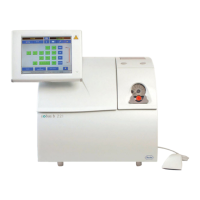Roche Diagnostics May 2009
A-8 Service Manual · Version 9.0
1 Safety information cobas b 221 system
ESD protection measures
ESD protection measures
Explanation of the phenomenon
The most frequent cause of electrostatic discharge is friction of various materials such
as plastic, synthetic fiber, hard rubber or paper.
It can also be caused by bending or applying pressure to a material.
Discharges that are dangerous to components occur when "charged" bodies or
components do not have a discharge connection (ground) to discharge the
electrostatic charge.
The discharges normally do not have a high capacity, but there are often voltage
differences in the range of several thousand volts. The discharges are perceived as
small shocks or visible sparks.
Examples: o Shoes with rubber soles:
Friction is caused by walking. A person develops an electrical charge different
from the ground. A discharge occurs when an object (e.g. door handle) is
contacted.
o Synthetic fiber clothing:
Discharge is audible and is visible in darkness.
Influence of electrostatic charges on components
If a person with an electrostatic charge touches a component, a discharge over a
connection of an IC or semiconductor element may occur. The resulting voltages may
damage the component.
Critical situations can occur while repairing or testing components if they are lying
on a more or less conductive surface (e.g. table top) and a person with an electrostatic
charge touches them. A discharge through a critical component connection can also
occur in this case.
ESD = Electrostatic Sensitive Device
The dryer the air the greater the risk of electrical discharge caused by friction.
Eectrostatic charges are less likely to build up in humid air, particularly when saturated with water
vapor.
The probability of ESD phenomena is therefore particularly great in a northern hemisphere winter
in centrally heated rooms where the humidity is low.

